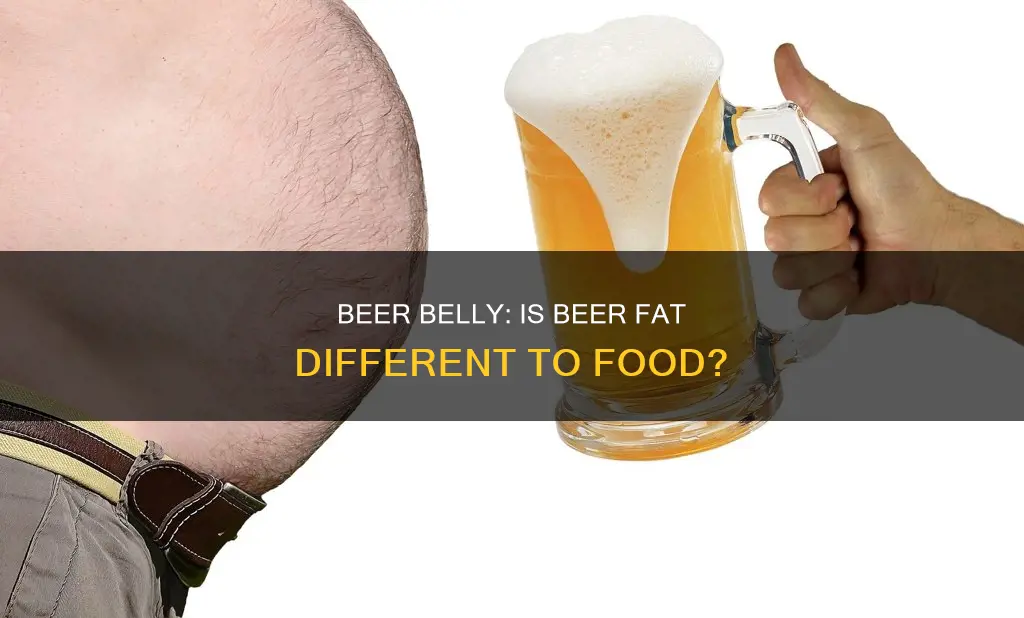
Beer is often associated with an increase in body fat, particularly around the belly. This is commonly referred to as a beer belly. However, beer does not contain any fat. The amount of alcohol in beer is the most caloric ingredient, with one gram of alcohol containing 7.1 calories. Beer also contains sugar, which can lead to weight gain. The customs of beer drinking, such as eating salty, greasy bar food, can also contribute to weight gain. Additionally, alcohol can prevent your body from burning fat, as your body prioritises the breakdown of alcohol over other sources of fuel, including stored fat.
| Characteristics | Values |
|---|---|
| Does beer contain fat? | No |
| Does beer cause weight gain? | Yes, if consumed in large quantities |
| Does beer have calories? | Yes, 150 calories per beer on average |
| Does beer have more calories than spirits or wine? | Yes |
| Does beer affect men and women differently? | Yes, men are more likely to gain weight and store fat around the belly |
| Does beer have any health benefits? | Yes, it contains folate, which helps lower the risk of heart disease |
What You'll Learn

Beer contains calories, which can lead to weight gain
Beer is a fermented alcoholic drink made from grain, such as barley, wheat, or rye. It is brewed using a five-step process that includes malting, mashing, boiling, fermenting, and bottling. The nutritional value of beer varies depending on its type, but it typically contains a significant number of calories. A standard 12-ounce (355-millilitre) serving of regular beer with approximately 4% alcohol content contains around 150 calories.
Beer contains calories, primarily from alcohol and carbohydrates. Alcohol contains about seven calories per gram, which is higher than proteins and carbohydrates (four calories per gram) but lower than fat (nine calories per gram). The more alcohol a beer contains, the more calories it has. For example, a typical beer with 150 calories can lead to a calorie overload if consumed in large quantities. Additionally, alcohol can increase appetite, leading to the consumption of more calories from food.
The excess calorie intake from beer can contribute to weight gain, including belly fat. This is often referred to as a "beer belly." However, it is important to note that the link between beer consumption and weight gain is not solely due to the calories in beer. Beer drinking is also associated with customs and lifestyle factors that can contribute to weight gain. For example, beer is often consumed with salty, greasy, and fatty bar foods. Additionally, drinking beer can make people less active, further contributing to an expanding waistline.
While beer itself does not contain fat, excessive beer consumption can lead to weight gain and an increased risk of health problems. The key to maintaining a healthy weight while enjoying beer is moderation. Limiting consumption to one beer per day or less and adopting a healthy, active lifestyle can help minimize the risk of weight gain and associated health issues.
Mexican Beers: Unique Flavors and a Cultural Legacy
You may want to see also

Alcohol prevents the breakdown of fat
Alcohol is high in kilojoules and provides empty calories, meaning it offers little nutritional value. These calories are also deceptive, as alcohol passes through the system rapidly, often before the drinker realises how many drinks they've had. Alcoholic drinks are often combined with mixers, further increasing the calorie count.
When alcohol is consumed, it is burned first as a fuel source before the body uses anything else. This means that excess glucose and lipids are stored as fat. Alcohol also affects the liver, which plays a crucial role in metabolising and storing fats and carbohydrates. Excess alcohol consumption can lead to alcoholic fatty liver, which can damage the liver and affect the way the body processes and stores fat.
In addition to preventing the breakdown of fat, alcohol can also contribute to excess belly fat. Alcohol is often associated with a larger waist circumference, as it affects where the body stores fat. When you consume more calories than you burn, the excess is stored as fat. Age, sex, and hormones also play a role in fat distribution.
Alcohol can also increase appetite and affect judgement, leading to poor food choices. It lowers inhibitions, making it harder to resist the urge to eat, especially when intoxicated. Alcohol has also been shown to stimulate hunger signals in the brain.
To summarise, alcohol prevents the breakdown of fat by interrupting normal metabolic processes and prioritising its own elimination. This, combined with alcohol's high calorie content and its ability to increase appetite, can lead to weight gain and excess belly fat.
Oktoberfest Beers: What Sets Them Apart?
You may want to see also

Beer contains phytoestrogens, which may increase the risk of storing belly fat in men
Beer is often associated with increased body fat, particularly around the belly, and is commonly referred to as a "beer belly." While beer does not contain fat, it has the bulk to stretch the stomach lining and contains sugar. Beer also contains alcohol, which has about seven calories per gram, higher than carbohydrates and protein.
Beer may increase the risk of storing belly fat in men due to its phytoestrogen content. Phytoestrogens are plant compounds that can mimic the female sex hormone estrogen. The flowers of the hop plant, which are used to flavour beer, are known to be very high in phytoestrogens. It has been suggested that the hops in beer might cause hormonal changes in men that increase the risk of storing belly fat. However, it is unknown how these plant compounds affect their weight or belly fat.
In addition to the potential effects of phytoestrogens, beer may also contribute to belly fat in several other ways. Firstly, it increases calorie intake, as it contains as many calories as a soft drink. Secondly, it may prevent fat burning, as the body prioritises the breakdown of alcohol over other sources of fuel, including stored fat. Finally, drinking beer is often associated with consuming high-calorie foods, such as pizza, wings, and other fried foods.
While the link between beer and belly fat exists, it is important to note that moderate consumption of one beer per day or less is not typically linked with developing a "beer belly." However, drinking larger amounts of beer or binge drinking regularly significantly increases the risk of belly fat and various health problems.
Explore the Difference Between Ales and Lagers
You may want to see also

Beer is often accompanied by fatty foods
Firstly, alcohol can increase appetite, leading to the consumption of more food than usual. This is especially true when drinking beer at a bar or party, where fatty foods such as pizza, wings, and fried dishes are commonly available and consumed alongside beer. The combination of beer calories and the calories from these fatty foods can result in a significant calorie overload.
Secondly, the context in which beer is consumed can influence the types of food that are paired with it. Beer is often enjoyed in social settings, such as bars, parties, or sporting events, where fatty, calorie-dense foods are readily available and may be more appealing to drinkers.
Additionally, alcohol has an impact on fat metabolism. When you drink alcohol, your body prioritizes breaking down alcohol over burning fat. This means that drinking beer, especially in excess, can prevent your body from effectively burning fat.
It is important to note that while beer is often accompanied by fatty foods, the development of a "beer belly" is influenced by various factors, including overall calorie intake, age, sex, hormones, and physical activity levels. Maintaining a balanced diet, exercising regularly, and consuming beer in moderation can help mitigate the potential impact of beer and fatty foods on weight gain and belly fat accumulation.
Oklahoma Beer: Unique Taste or Marketing Ploy?
You may want to see also

Beer is carbonated, which can cause bloating
The good news is that there are ways to reduce the amount of carbonation in your stomach. One simple solution is to pour your beer into a glass before drinking it. This allows the beer to breathe and release more CO2, reducing the likelihood of feeling bloated.
Another factor contributing to bloating is alcohol's impact on digestion. Alcohol can slow down the rate at which your stomach empties its contents, leading to a feeling of fullness and bloating. Opting for lower-alcohol beers can help minimise this sensation, as your body can process the contents of your stomach more efficiently.
Additionally, some beers may contain unfermented sugars that have not been converted to alcohol during the brewing process. These sugars can also increase gas production during digestion, further contributing to bloating. Choosing well-brewed beers from quality breweries can help minimise this issue.
While beer's carbonation can cause bloating, it's important to note that other factors, such as the amount of alcohol and the presence of unfermented sugars, also play a role. By being mindful of these factors and following simple tips like pouring your beer into a glass, you can enjoy your drink while minimising the uncomfortable effects of bloating.
Explore the Difference Between Ales and Lagers in Beer
You may want to see also
Frequently asked questions
No, beer does not contain fat. However, it does contain sugar and has a high calorific content.
Beer is associated with fatness because of the bloating caused by carbonation and the presence of malt (a carbohydrate). Beer is also linked to weight gain because it is often consumed with fatty foods such as pizza, wings, and other fried foods.
Beer typically has fewer calories than spirits and whisky. It also usually has fewer calories than wine. For example, a 4.5% beer contains about 34 calories per 100 grams, while wine with 13% ABV contains about 83 calories.
Yes, the alcohol content of beer can vary widely depending on the style. Generally, light-coloured beers are lighter and have fewer calories. German, bottom-fermented lagers are an example of beers with lower alcohol content.
Beer consumption can contribute to weight gain, including belly fat, especially when consumed in excess (more than one beer per day or regular binge drinking). This is because alcohol prevents the body from burning fat and increases calorie intake.







